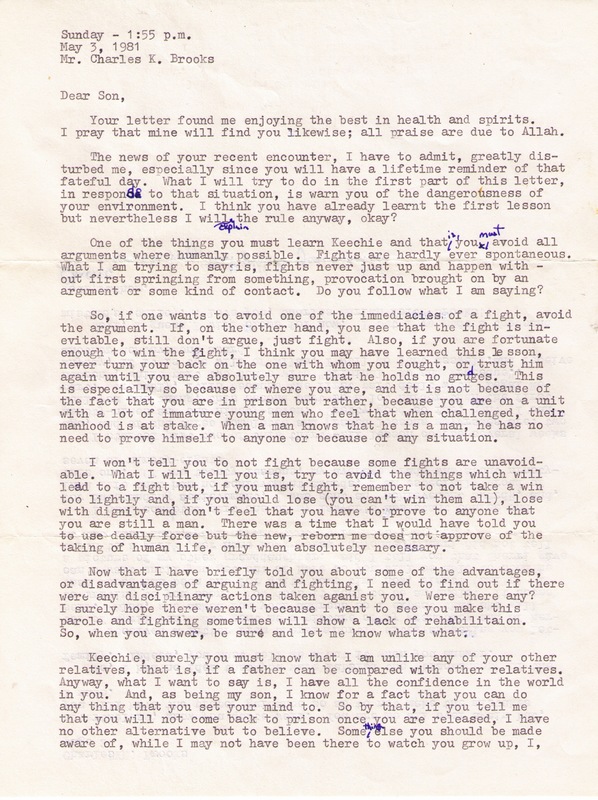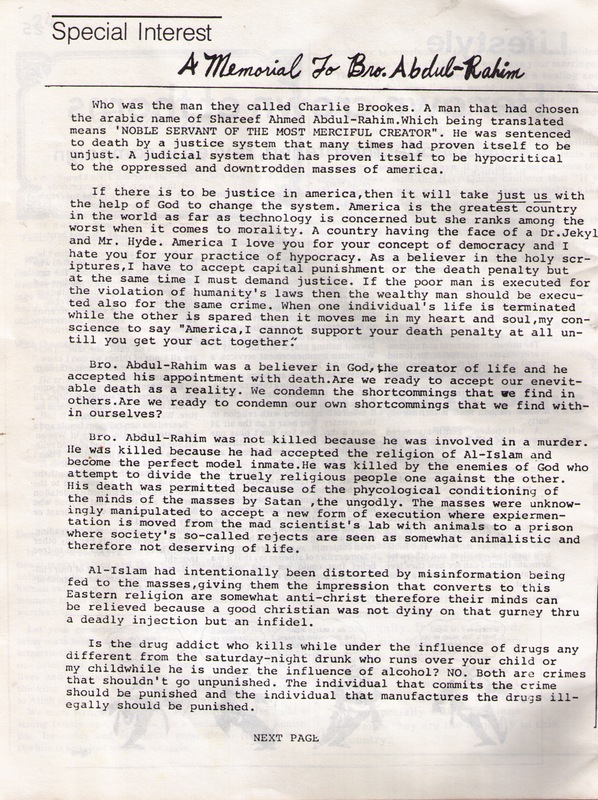Inhuman Punishment in the Charlie Brooks, Jr. Case
"No one shall be subjected to torture or to cruel, inhuman or degrading treatment or punishment." Article 5, Universal Declaration of Human Rights
This is a typed letter written from Charlie Brooks, Jr. to his son Keith Brooks, dated May 3, 1981. In the letter, Charlie Brooks, Jr. mentions an “encounter” that his son had that got him in trouble. Charlie Brooks, Jr. advises his son in the letter to avoid fights and arguments whenever possible; however, he does not suggest that he never fights again because some fights are bound to happen. Charlie Brooks, Jr. tells Keith that he will always believe in him. After Charlie Brooks, Jr. discusses Keith’s “encounter” he mentions a woman named Sherri and her baby. Then he mentions that he has been taking classes in prison and doing well.
One thing that sticks out during this letter is that Charlie Brooks, Jr. calls his son Keechie. This demonstrates a father-son relationship, even though Charlie Brooks, Jr. is in jail. Although Charlie Brooks, Jr. is in prison for a crime, it is clear that family relationships are still important to him. Derrek mentions how his father always wrote him from jail in his oral history. Derrek admits that his dad was not always around for school events, birthdays and holidays, but once he was in jail he made an effort to be involved in the family. Derrek said, “the year before he got executed, the city of Fort Worth let him use the phone to call us. So I remember talking to him on the phone for hours and he would always write us letters, always write us letters, on birthdays you know I hope this letter finds you well, this is your father, I want you to know that I love you, I am sorry that I am in here, you know I am trying to get out, you know supportive things, what are you doing, how are your grades” (19:29-19:55). The letter from Charles Brooks and the oral history about him show that he tried to parent even when he was in jail.
These letters connect to the Universal Declaration of Human Rights Article 5. Article 5 is saying that no one should be cruelly punished; however, Charlie Brooks, Jr. was killed by lethal injection for a crime that he may or may not have committed. These letters show how the sons were close with their father so Charlie Brooks, Jr.'s punishment also impacted their life. Lethal injection could most definitely be considered a form of inhumane punishment.
This leads to the second primary source of the Charlie Brooks, Jr. memorial. The memorial begins by discussing Charlie Brooks, Jr.’s commitment to Islam faith but moves quickly to the justice system and the reasoning for his death. In the memorial, it says that the “judicial system has proven itself to be hypocritical to the oppressed” because it is not fair to everyone. Since one of the people involved in the crime was not in trouble and one was sentenced to death, the system is not fair. After questioning the justice system and America’s morality, the memorial focused on Charlie Brooks’ faith again, suggesting that his faith in Islam was part of the reason he was given the death penalty. The memorial service shows how his friends and family were upset with the outcome of the trial and shows that they do not think Charles Brooks was given a fair trial.
In Derrek’s oral history, he says, “One of them is supposed to what is it relax your breathing and then one is supposed to stop your heartbeat and one is supposed to do something else I can’t remember [...] After the first drug went in he clenched his fist and then after the second drug went in his chest went up and then after the third drug they pronounced him dead” (41:54-42:28). In this scene, he is describing how the state killed his father. Although the Universal Declaration of Human Rights says that no one should receive inhuman punishment, the United States still performed the lethal injection.
From evaluating the primary sources, I realized that the United States does not follow the Universal Declaration of Human Rights strictly, even though the United States is part of the United Nations. I believe that the United States supports the Universal Declaration of Human Rights as a guideline on how people should be treated but not as a clear set of rules. I make this assumption because the United States believes in equality and opportunity for everyone, but the United States still uses lethal injection to punish people. This form of punishment is clearly a violation of Article 5 of the Universal Declaration of Human Rights.
By: Kayla Guerin


